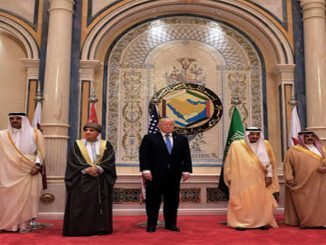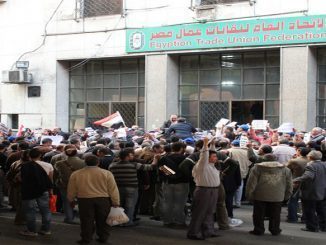![Freedom of Expression - Journalism is not a crime [187513] Egypt Criticizes the EU External Action Service’s Statement](https://middleeastobserver.org/wp-content/uploads/2016/06/Freedom-of-Expression-Journalism-is-not-a-crime-187513.jpg)
An Egyptian court has sentenced the head of the Journalists’ Syndicate and two of its board members to two years in prison and 10,000 pounds (around $650) fine each for harboring two wanted journalists.
After a seven-month trial, a ruling was issued against Yahia Qalash, the head of Egypt’s Press Syndicate, and board members Khaled el-Balshy and Gamal Abdel-Rahim.
In response, the Committee to Protect Journalists condemned the conviction, saying the ruling is a “punishment” and called on authorities to ensure that journalists work without “fear of reprisal.”
The Press Syndicate’s crisis started when the Egyptian security forces stormed its building for the first time in history and arrested two journalists: Mahmoud El-Sakka and Amr Badr – who were staging a sit-in to protest the arrest of their colleagues during the protests of Sinai Liberation Day – in the syndicate’s downtown Cairo headquarters. The crisis escalated when the Press Syndicate led by Qalash held an emergency meeting that called for the interior minister’s resignation and a presidential apology over the arrest of two journalists wanted for inciting protests who had taken refuge inside the headquarters of the Press Syndicate. Instead, Qalash and two others were detained and charged of harboring the wanted men inside the press syndicate’s building.
Following the verdict, heavy security forces were deployed to the headquarters of the syndicate in downtown Cairo, amid calls for protests.
Dozens of journalists staged a sit-in outside the syndicate and chanted slogans, such as: “Are we in a state or a jungle?”
3 years in prison for 3 TV presenters in absentia
In addition, a Giza Court sentenced in absentia three TV presenters to three years in prison each, on charges of spreading false news, disturbing public safety, and inciting sectarian tension. The three TV hosts, Mohammed Nasser, Moatz Matar, and Hisham Abdullah, are vocal al-Sisi critics… ” according to Washington Post.
According to the WP, “Defendants tried in absentia in Egypt typically receive maximum penalties, but receive an automatic retrial usually ending with lighter sentences if they turn themselves in.”
In fact, the crackdown on press and speech freedoms escalated under Abdel-Fattah al-Sisi’s regime, after Sisi led a military coup against Egypt’s first democratically elected President Mohammed Morsi.
The Egyptian authorities banned many journalists and TV hosts from appearing on TV, deported, or had their shows canceled. In addition, several reporters and photographers were arrested, detained, and tried over alleged links to Islamists.
“Al-Sisi has been intolerant of criticism in the press and repeatedly said that stability and national security were a prerequisite for democracy,” said the WP. According to the Report on Freedom of Speech and Media in 2016 of Freedom House, a U.S.-based NGO that conducts research and advocacy on democracy, political freedom, and human rights, “Abdel Fattah al-Sisi’s efforts to silence dissent and shutter outlets affiliated with the now-banned Muslim Brotherhood have produced a media environment in which most public and private outlets are firmly supportive of the regime. In 2015, authorities continued to employ a variety of tools against journalists and media outlets that strayed from officially sanctioned narratives, including legal prosecution, gag orders, and the outright halting of operations. Dozens of journalists were physically assaulted during the year by both security agents and civilians.”
In the same context, the World Press Index in 2016 stated that “Five years after the “25 January Revolution” of 2011, the situation of media freedom in Egypt is extremely worrying. Successive governments have tried to control the media, and have not hesitated to impose measures restricting journalists’ freedom. Under Gen. Sisi’s leadership, the current authorities are orchestrating a “Sisification” of the media and a witch-hunt against the now-banned Muslim Brotherhood. Under an anti-terrorism law adopted in August 2015, journalists are obliged on national security grounds to report only the official version of “terrorist” attacks.



